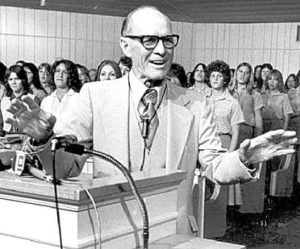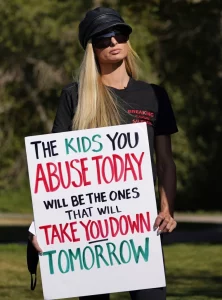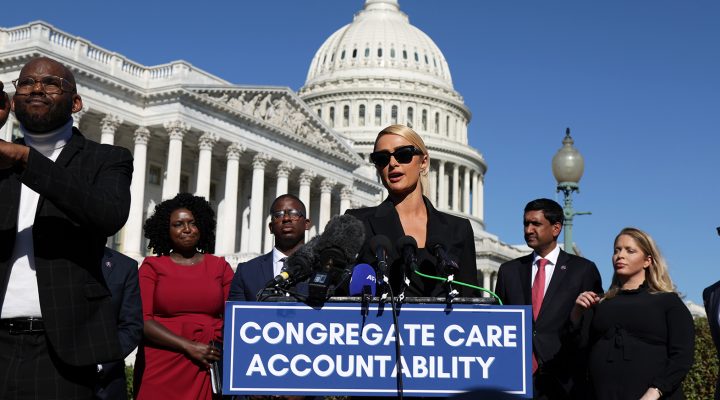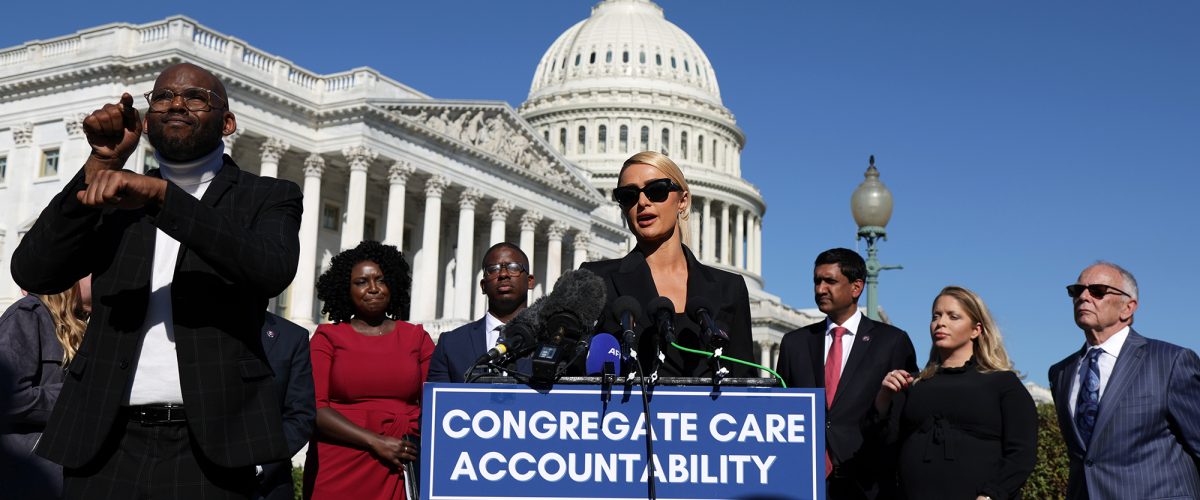Young people all over the internet are speaking out about their traumatic and life-altering experiences in something called the Troubled Teen Industry.
The Troubled Teen Industry is “a system of underregulated residential youth treatment facilities” operating under the guise of mental health care. These institutions market themselves as places where teenagers will live for extended periods of time in treatment for various reasons, such as struggles with mental health, sexual orientation and misbehavior.
The industry dates back to the 1958 creation of what is now known as the Cult of Synanon. Synanon was a nonprofit drug addiction rehabilitation center. In 1974, the institution sought religious status to avoid legal battles over zoning law violations.

Synanon founder Charles Dederich (Photo by Bettmann Archive/Getty Images)
Although claiming to be nonviolent, Synanon used tactics such as brainwashing, psychological torture and physical beatings to encourage the submission of its members.
Synanon is no longer an operating institution, but its practices had a lasting effect. Unregulated “wilderness therapy programs, boot camps, residential treatment centers, therapeutic boarding schools, religion-based programs, and drug rehabilitation programs” that all claim to cure mental health and behavioral issues have arisen due to the cult’s legacy.
Survivors of Troubled Teen Industry institutions that do not claim to be religion-based often recall an emphasis on Christian values and ideals within the programs, despite no explicit religious affiliation. However, like Synanon, many of these institutions do explicitly market themselves as religious, and many utilize Christian ideals to maintain their power over members and their families.
Lester Roloff’s Rebekah Home
Rebekah Home, a program begun in 1968 by Lester Roloff, a fundamentalist Baptist evangelist, was a home for “wayward” teen girls. This institution aimed to cure issues of mental health and behavior through strict adherence to Christian morality and beliefs about salvation.

Lester Roloff
Despite claiming adherence to Christian values, residents at the facility were “routinely whipped, beaten, and locked in solitary confinement,” according to a March 2022 article by Lydia Joy Launderville, who also is a BNG columnist.
One witness, Lynn Beisner, the daughter of a staff member at Rebekah Home, recalls the torturous living conditions at the institution. She states that some girls lived in rooms “alone with nothing but a bucket toilet, mattress, nightgown and Bible.” She also states that “Roloff’s sermons were played on the intercom 24/7.”
Although Roloff faced legal condemnation for these issues, organizations like this often are protected through the American principle of religious freedom.
In other words, if a Troubled Teen Industry organization is considered a religious institution, it can legally uphold the right to use abusive tactics so long as they claim these “therapeutic” methods are based on Christian principles.
Still a modern-day problem
Modern treatment among these programs is no better.
Some survivors, many of whom share their stories on Tik Tok, report being “kidnapped by strangers” from their homes in the middle of the night, only to be taken on a wilderness retreat. Many of these retreats lasted months, or even years at a time, and teens were underfed, sexually or physically assaulted, not allowed to bathe, forced to do hard labor and unable to contact their families.
Other survivors, such as those detailed in a Refinery 29 article, report methods of therapy that were abusive, often including the breaking of confidentiality between therapists and clients.
She was forced to take part in a game called “hot seat,” where every person in the room was asked to insult or shame one member as they listened.
One survivor, Charlotte Rayburn, who attended Eva Carlston Academy, notes she was forced to take part in a game called “hot seat,” where every person in the room was asked to insult or shame one member as they listened. These sessions often included “therapists,” who told the group about the individual’s personal trauma or reasons for being in the facility, often in ways that shamed the survivor.
Rayburn also told Refinery 29 her abusers used a technique called “sculpting,” in which a person would get up in front of an audience and act out traumatic events in their life with audience members. She was forced to publicly sculpt her own rape, as well as other sexual assaults she had experienced. This was a common experience among the girls in the facility, she said.
A deadly industry
A large number of teens do not survive Troubled Teen Industry programs. An online list of deaths reported by American facilities and programs accounts for nearly 200 children ages 9 to 19 who died in the care of such facilities. Reasons given for these deaths range from “shot during escape” to “found hanging” to “choked to death after being forced fed lying down” and worse.
The list is incomplete — partly because only American facilities are considered — but also because it only considers deaths that occurred during a person’s stay in the Trouble Teen Industry program and depends on the honest reporting of employees who may have been involved in abusive and manipulative behavior.
Revenue centers
In addition to being traumatizing and deadly, these “treatment” centers are very expensive and act as huge sources of revenue for their operators.
According to a New York Times opinion article, some programs cost families as much as $800 per day. It is also believed that many of these programs are intentionally understaffed, as to avoid paying wages that would cut into the organization’s profits. With little government oversight, the industry generates at least $1 billion every year.
If Trouble Teen Industry programs are so expensive but do not provide adequate care, why do families continue to send their teenagers away?
Most families and guardians of teens genuinely believed they were sending their loved ones to places where they could receive help.
According to the same New York Times article, most families and guardians of teens genuinely believed they were sending their loved ones to places where they could receive help.
One mother of a child with high-need disabilities reported that an institution “was advertised to her as one of the only places in the country that would care for a child with (her son’s) intense medical supervision needs.”
However, this mother was dreadfully deceived, as she quickly discovered her son, whose medical conditions required around-the-clock care and supervision, was being ignored by staff.
Although the institution promised her they would care for her son, providing staff in his room 24/7 to watch for and respond to potential seizures and falls, they did not. In fact, while he was in the facility, her son’s condition quickly declined due to neglect, and she believes his current, lasting condition is worse than before but could have been avoided with proper medical treatment.
Paris Hilton a survivor
Among the survivors is Paris Hilton, who is sharing her story and utilizing her celebrity platform to lead a movement of protests against these institutions.
 Hilton opened up about her experiences in the 2020 documentary This Is Paris. She also is featured in the New York Times article as well as other news and opinion pieces about the Troubled Teen Industry and is responsible for a public effort to shut down the industry for good.
Hilton opened up about her experiences in the 2020 documentary This Is Paris. She also is featured in the New York Times article as well as other news and opinion pieces about the Troubled Teen Industry and is responsible for a public effort to shut down the industry for good.
Provo Canyon School is the institution Hilton attended in the 1990s. She recalls random gynecological examinations being performed on herself and other survivors during their stay, always in the middle of the night. Hilton states that these exams never were performed by doctors, and the purpose of these exams never was properly explained. Rather, staff (often male) would “have us lay on the table and put their fingers inside of us.”
In an interview with Newsweek, Hilton said she often was “sleep-deprived and heavily medicated” at the time of these exams and that if she protested these examinations, she would be met with frightening backlash from staff.
As a survivor, Hilton says “the physical, emotional and sexual abuse I suffered led to years of trauma-induced insomnia and complex post-traumatic stress disorder that I and countless other survivors of institutional child abuse have struggled with for years.”
Parents unaware
There are many stories like Hilton’s, and teens in America are still being sent to Troubled Teen Industry programs.
Why were parents not outraged by the treatment of their children? Because they did not know. Parents were promised a safe, therapeutic and often religion-based environment for their teens to receive care, and parent-child contact was slim. Most survivors recall their phone calls being monitored, and some account that staff would end their phone calls if they revealed negative things about the treatment center.
Other survivors recall the use of psychological torment and manipulation. Staff members would discourage them from telling the truth because their parents would not believe them.
Here are some quotes from the New York Times article from survivors who tried to tell their parents what was happening but were prevented by staff:
- “We had to sit at the nurse’s station for phone calls.”
- “The second you start to express how you are being treated (over the phone), they have that option to cut the line.”
- “The staff member” hung up the phone and “screamed at me” stating “We’re going to tell your parents that you’re manipulating them, that you’re lying.”
What can be done?
If abuse in these residential treatment centers still exists, is anything being done about this?
An organization called Breaking Code Silence is a nonprofit that “represents children, youth and adults who are/were incarcerated” in the Trouble Teen Industry.
On their website, users can easily report various types of violence, such as HIPPA violations or child abuse. The organization also provides educational resources for teens and parents about the Troubled Teen Industry, as well as links to other organizations that advocate for and support survivors of this abuse. The site also provides survivors an easy guide to help them request medical records they may have lost or been withheld from during their residential stays.
Mallory Challis is a senior at Wingate College and serves this semester as BNG’s Clemons Fellow.
Related articles:
Texas officials’ new attack on transgender care called a ‘political ploy’ at the expense of children
John MacArthur rallies pastors to preach against government bans on conversion therapy Jan. 16


